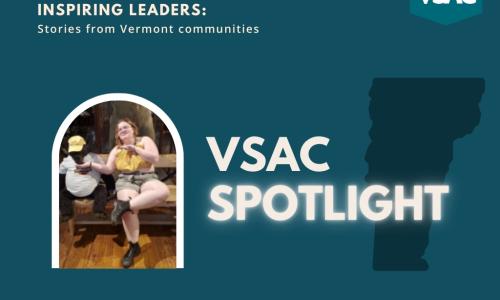Planning for college or training this year? Apply for the Vermont Grant.
She beat addiction—now Amanda Southwick wants to help others

When 36-year-old Amanda Southwick was a student at Poultney High School, she was a high achiever. Her parents recognized and supported her academic promise: they expected her to make the honor roll each semester, and they encouraged her to think about college. Amanda was an active participant in VSAC’s GEAR UP college preparation program, meeting regularly with her VSAC counselor and taking field trips to college campuses. “I love that I was able to get started with VSAC in 7th and 8th grade. I took college classes my senior year of high school, and I made a lot of really good plans because of VSAC,” Amanda recalls.
Instead of following those plans, Amanda’s journey right after high school led her deep into addiction. Early experimentation with pills, a back injury, a desire to fit in, and hanging around friends and boyfriends who were using drugs every day all contributed, Amanda says.
I had physical pain and emotional pain, and the pills just numbed everything. My parents did everything they could to help me be successful. My addiction was just a part of my journey, and unfortunately, there wasn’t anything they could do about that.
After surviving the consequences of that journey—which included a short time in prison for drug possession, a series of harmful relationships, and a harrowing experience of domestic violence—it was ultimately her love for her children that propelled her into rehab and recovery and gave her the strength to flee her abusive ex-husband. “I was always able to not use while I was pregnant, but I’d fall right back into it afterwards,” says Amanda, who was inspired to set an example of strength for her daughters, Braelynn, Brylee, and Remy, now 16, 13, and 8. “I wanted my girls to know that violence isn’t okay, that we’re strong, independent women, and that we can make it on our own,” she says. (Amanda has added to her family since her recovery; her family now includes 1.5-year-old son Ryker, whom she calls her “wonderful surprise.”)
Becoming a beacon of light
Today, Amanda hopes to use her experience to provide support for others who are struggling with addiction. “If I can be the person for someone to lean on and get through, that’s what I feel like I’m here for,” she says.
To do that well, she wanted to add formal training to her lived experience, and her mind returned to a longtime interest in psychology.
Ever since I can remember, I’ve always loved horror and true crime stories. I want to understand what makes people tick, what drives a person, and is a person born a certain way or do they learn their behaviors? That’s always interested me.
Amanda started her educational journey at her local Turning Point Center in Springfield. “I completed every training they offered,” she says. She is now a “Train the Trainer” for Narcan administration, a Certified Recovery Group Facilitator, and a recovery coach.
Then she decided it was time to go to college. So in 2021, she reached out to VSAC—this time, to the Educational Opportunity Center, which supports adult students looking to continue their education.
VSAC was the first place I called when I started thinking about going back to school. They’ve been so helpful in setting me up with grants and scholarship opportunities so I can afford it. I really owe a lot of my academic success to them.
After earning an associate’s degree in human services and a certificate in substance abuse counseling from the Community College of Vermont, Amanda is now on her way to completing two bachelor’s degrees from Vermont State University-Castleton—the first in psychology and human services, and the second in applied psychology. Amanda’s ultimate goal is to earn her master’s degree as a licensed alcohol and drug counselor (LADC) and to start her own end-to-end recovery center with all services on-site.
“A lot of places offer just one piece,” Amanda explains. “They’ll say, ‘you can detox here,’ but then the person doesn’t have a place to go afterwards—and they’re expected to stay clean. Not everyone has supportive family and friends like I do, and that’s a difficult model,” she says. “Plus, not everyone can get to Rutland or Burlington.”
Building a community in healing
Martha McCaughin, an outreach counselor with VSAC’s Educational Opportunity Center who has worked with Amanda since 2021, says she’s impressed that Amanda has already found ways to use her education and work in her field. She started a recovery group called Warrior Moms, centered around exercise and fellowship for new parents, in partnership with Slate Valley Cares, a food security and community-building organization. And she’s currently looking for additional grant funding to support more 12-step and holistic recovery programs.
“I’ve lived through so much,” Amanda says. “Being able to take all the bad and turn it into something positive to help others is such a magical feeling.” And getting a college education, she says, was a key part of it.
“Now, I’m thankful I didn’t go to college right out of high school. Academically, I might have been ready then, but mentally, I wasn’t. Being in addiction, I would have messed it up. Now, I love school, and I’m getting a lot out of it. I know what I want to go for, and I’m studying things I’m so passionate about. All of that together is setting me up for success.”





